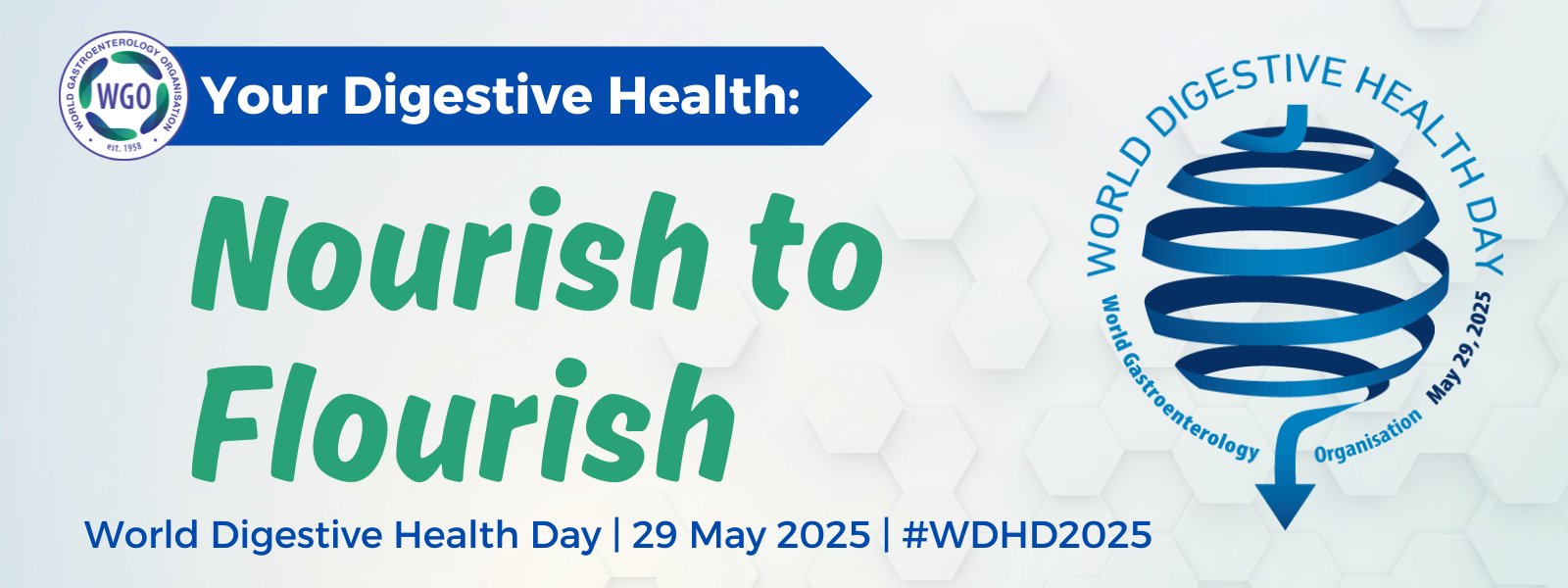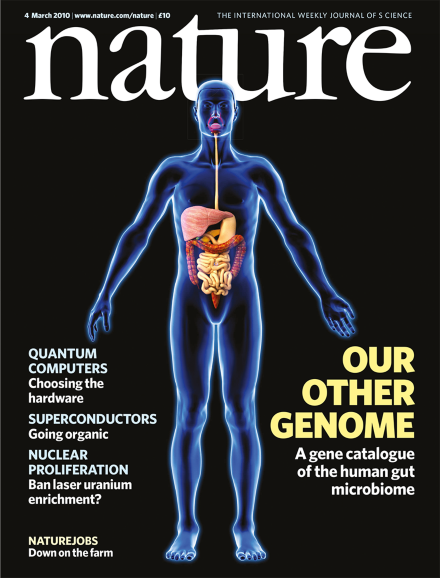Each year on May 29, World Digestive Health Day (WDHD) focuses on key themes aimed at raising awareness about the prevention, detection, and treatment of gastrointestinal (GI) diseases. The 2025 theme, "Your Digestive Health: Nourish to Flourish," highlights the vital role of the digestive system in overall well-being, encouraging nourishing dietary choices to improve quality of life.
 The 2025 theme of World Digestive Health Day (WDHD) is Your Digestive Health: Nourish to Flourish.
The 2025 theme of World Digestive Health Day (WDHD) is Your Digestive Health: Nourish to Flourish.
Digestive diseases like irritable bowel syndrome, Crohn’s disease, colorectal cancer, and celiac disease affect millions globally, yet they are often misunderstood or neglected. WDHD provides a platform to educate the public on prevention and early detection. This mission aligns seamlessly with the efforts of BGI Group, whose groundbreaking research in gut microbiota and innovative technologies have driven significant advancements in understanding and improving digestive health.
BGI’s Contributions to Gut Microbiome Research
In 2008, BGI joined the European Union-funded Metagenomics of the Human Intestinal Tract (MetaHIT) project, a global collaboration involving 13 institutions from 8 countries. This initiative aimed to map the human gut microbiome and explore its links to various diseases. As the only non-EU participant, BGI sequenced over 200 gut microbiome samples and conducted bioinformatics analyses, laying the groundwork for future discoveries.
This foundational work catalyzed further progress. In 2010, BGI led the development of a human gut microbial gene catalogue, a key result from the MetaHIT project, which was published in Nature. This research marked the beginning of high-throughput sequencing in gut microbiome studies, providing a comprehensive genetic reference for exploring microbial composition and function. In the same year, Science called the concept of the microbiome one of the top 10 scientific insights that changed the face of science during the first decade of the 21st century.
 In March 2010, the BGI-led research "A human gut microbial gene catalogue established by metagenomic sequencing" was published as a cover article in Nature. (Credit: Roger Harris /Science Photo Library)
In March 2010, the BGI-led research "A human gut microbial gene catalogue established by metagenomic sequencing" was published as a cover article in Nature. (Credit: Roger Harris /Science Photo Library)
Momentum continued to build, and in 2019, BGI published the world’s largest collection of gut bacterial genomes, the Culturable Genome Reference (CGR), in Nature Biotechnology. This effort involved sequencing 6,000 gut bacteria strains and identifying over 338 bacterial species, including many previously unknown, enriching the global gut microbiome database. The study provided an invaluable resource for exploring microbial diversity and disease associations.
By 2023, BGI achieved another milestone in gut microbiome study by substantially expanding the CGR. Published in Nature Communications, BGI researchers constructed a reference of 3,324 high-quality draft genomes from isolates selected from a large-scale cultivation of bacterial isolates from fecal samples of healthy individuals, termed CGR2. This new resource is helping researchers better understand the process of dietary fiber metabolism and short-chain fatty acid synthesis of human gut bacteria. The study also discovered valuable secondary metabolite biosynthetic gene clusters within the gut microbiota and constructed phage-bacterium linkages in the human gut. In addition, it supports the development of probiotics and functional foods, while advancing research into the gut microbiota’s role in aging and metabolic health.
In 2024, BGI achieved two major breakthroughs that further advanced the field of digestive health. First, in collaboration with Uppsala University, BGI researchers published a study in Nature identifying 96 critical mutated genes in colorectal cancer, including 24 previously unknown driver genes. This research provided valuable insights into early detection and targeted therapies for colorectal cancer.
Second, BGI partnered with Ruijin Hospital at Shanghai Jiao Tong University School of Medicine and revealed that gut bacteria, specifically the genus Megamonas, contribute to obesity by enhancing lipid absorption through the degradation of myo-inositol. This discovery offered new strategies for obesity prevention and treatment, opening the door to future microbiome-targeted interventions.
Advancing Probiotics and Functional Foods
BGI’s extensive research on the gut microbiome has also paved the way for the development of probiotics and functional foods tailored to the health needs of population. By isolating and analyzing beneficial bacterial strains, such as Lactobacillus rhamnosus OF44, BGI has created products designed to enhance gut health, improve nutrient absorption, and boost immunity. They represent a significant step forward in the use of microbiome-based interventions to promote digestive health and prevent disease.
These probiotics are backed by rigorous scientific research and clinical validation, ensuring their efficacy and safety. As of December 2024, BGI has published a total of 117 research papers in the field of human microbiome research, including 37 studies in leading international journals - Nature, Science, and Cell - further demonstrating its leadership and innovation in this field.
Innovations in Colorectal Cancer Screening
Colorectal cancer (CRC) stands as one of the most severe global health threats, ranking as the third most common and second most deadly cancer worldwide. In 2020 alone, CRC led to 1.9 million new cases and 900,000 deaths, accounting for 10% of global cancer incidence and 9.4% of all cancer-related deaths.
A significant challenge in combating CRC is that early-stage disease typically presents no symptoms, making timely detection difficult. Yet, early diagnosis is crucial, as patients identified at an initial stage can achieve five-year survival rates of up to 90%, compared to only 10% when detected late. Regular screening is therefore essential for improving outcomes, but traditional methods like colonoscopy can deter many individuals due to their invasive nature, discomfort, and complex preparation.
 Regular colorectal cancer screening is recommended. (Credit: Zcool Stock Images)
Regular colorectal cancer screening is recommended. (Credit: Zcool Stock Images)
Recognizing these urgent challenges, BGI has devoted years of research and innovation to improve CRC screening accessibility and effectiveness. BGI leverages its advanced sequencing technologies and scientific expertise to develop non-invasive screening methods, such as stool DNA methylation analysis. These solutions are designed to be accurate, convenient, and patient-friendly, significantly boosting screening compliance and facilitating earlier diagnosis. BGI also provides comprehensive support from sample collection to laboratory analysis, ensuring a streamlined process for both patients and healthcare providers.
BGI’s efforts to integrate cutting-edge technology with public health initiatives have made early detection and prevention of digestive diseases more effective and accessible. By providing tools and resources for large-scale screening and diagnostics, BGI has strengthened the efforts to improve digestive health outcomes. A major milestone is the May 2024 opening of the BGI-Heilongjiang Omics Health Axis Intelligent Laboratory in Harbin, China. Using ultra-high throughput sequencing and gene methylation technology, the lab’s first project is evaluating colorectal cancer risk for nearly 800,000 eligible residents aged 45 to 64. By integrating genomics, advanced imaging, and real-time health data, the lab sets a new standard for early detection and large-scale disease prevention - demonstrating BGI’s leadership in public health and precision medicine.
As the world celebrates World Digestive Health Day 2025, BGI’s contributions stand as a testament to the power of innovation in transforming digestive health. Through pioneering gut microbiome research, the development of life-saving diagnostic tools, and the creation of probiotics, it continues to lead efforts to keep digestive health at the heart of overall well-being.



